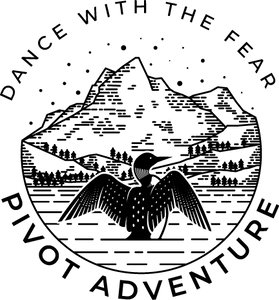
- Resiliency Course
- Partnerships
- About Us
- …
- Resiliency Course
- Partnerships
- About Us
- Resiliency Course
- Partnerships
- About Us
- …
- Resiliency Course
- Partnerships
- About Us
There is no growth in comfort zones and no comfort in growing zones.
All highly resilient people have one common characteristic and that is the ability to reframe the story they are telling themselves about their lives. When we take adversity and turn it into a learning experience, our quality of life dramatically improves. Adventure activities take students on a journey outside their comfort zones and into growing zones. With the guidance of mental health professionals, students learn how to respond, rather than react, to adversity. Without guidance, this process can take years of trial and error.
We learn as we go.
If we stop going, we stop learning.
To improve life, one must improve the quality of experience. At Pivot Adventure, we don't give insider tips about how to be happy. We don't even try. Instead, students learn to act. Act first. Act often. Together, once we commit to action, it gets easier to see. To see who we are and who it is we want to become, how people listen to our stories, how difficult (or easy) it is to make an impact. And then, once we can see, we open the door to real learning.
the gap in traditional therapy for teens
There are four major weaknesses:
1Therapy is generally not a voluntary experience for teens. Students often don't feel autonomy or control in choosing their care.
2Therapists use a deficit-based model where they must diagnose their patients to get paid by insurances. These labels can follow teenagers for the rest of their lives.
3Therapy is expensive. Residential treatment centers and wilderness therapy cost over $50,000. Very few families can afford this.
4Fifty-minute sessions do not feel like a personal investment to the student.
- Pivot Adventure is transforming the Mental Health Care systemAt Pivot Adventure, we designed our course to reinvent how teenagers receive care. Pivot Adventure uses a “challenge by choice” model so that the experience is voluntary. We use a strength-based model to identify what contributions students can make to the group (and to the world). Pivot Adventure also uses scholarships to make the course affordable for all. We spend four hours per week with students. This is enough time to build real relationships but is not overbearing like residential programs that pull students from their families and their lives.
Did you know?
Teens today are struggling. Out of the 42 million teens in the US researchers with the National Institutes of Mental Health have found that half of them meet the criteria for a mental disorder. In addition, the rates of suicide have steadily been increasing over the last several decades. Today it is now the number one cause of death for teens.
Pivot Adventure is a medium for change
It’s an experience for students and their families that want to shift their perspective. Pivot Adventure is also a sprint. Eight weeks with people like us, all moving in the same direction towards change. The notion of a sprint, of leaning in and committing to growth means Pivot Adventure is not for everyone. It’s not for people who want an excuse. It's for families who want to create change.
Every passing moment is a chance to turn it all around.
Questions?
Pivot Adventure - Utah-based 501(c)(3) transforming mental health care for teens.

